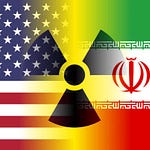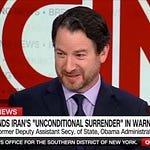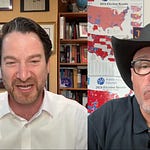I joined CNN’s NewsNight political table last Friday night, live from New York, to debate and discuss the issues of the day with the amazing host Abby Phillip and three other fantastic guests (Ashley Allison, Scott Jennings, Mike Leon). It was an inspiring experience and I’m honored to share a reel of the show with you. I’m also happy to share with you a post on how the multiple issues we discussed were woven together to create a common theme:
Chaos, Credibility, and the Cost of Governing by the Gut
In the swirl of this past week’s headlines - from Canadian trade disputes to targeted strikes in Iran to the president’s latest assault on higher education - there’s a connective tissue that binds these seemingly disparate events together: the erosion of coherent, strategic governance in favor of impulsive, performative politics.
Let’s start with trade. President Trump’s eruption over the digital sales tax that Canada was about to impose (and last night dropped) - a policy aimed at taxing the titans of tech - triggered him to no end. The fact that Trump couldn’t stomach the idea of someone like Jeff Bezos, who just dropped around $50 million for a wedding! - paying another dime, shows where his priorities are. One week it’s “Liberation Day,” the next it’s “TACO Trump,” and by September, maybe a deal. Maybe not. As he often likes to say, we’ll find out in a couple of weeks.
This isn’t negotiation. It’s chaos disguised as strategy.
That same improvisational flair reared its head again in the realm of foreign policy on Iran. I supported the recent strikes against Iran’s nuclear facilities. They were necessary and effective. But instead of translating them into diplomatic capital, the president turned to his favorite pastime: gloating. The win wasn’t the strike in and of itself - it was the opening for diplomacy that his strong approach created. To secure a true win, Trump needs his team to lock in the gains by getting a verifiable deal that permanently ensures Iran won’t get the bomb. But when you strut instead of strategize, you undermine your own goals by destroying your credibility.
We’ve seen this before. I was a civil servant in the State Department during the Iraq War, and a signature lesson from that catastrophic failure still echoes: if you want credibility for the hard decisions, you have to establish it. Credibility doesn’t come from tweets and proclamations that can’t be validated. It comes from honest assessments, steady leadership, and the ability to turn military might into diplomatic leverage.
Right now, we’re missing that opportunity with Iran. “Escalate to deescalate” only works if you follow escalation with de-escalation. That means letting Secretary Rubio and others do the behind-the-scenes work. That means keeping the focus on diplomacy - not television soundbites that undermine these efforts.
What’s striking is how bipartisan the architecture of our current Iran policy truly is. President Obama initiated development of the operational plans to bomb Fordow (if needed). President Trump inherited (and used) them. There’s room for serious, cross-party cooperation here - if only the president would let the diplomats, national security professionals, and both parties in Congress do their jobs.
But instead of governance, we get grievance. Nowhere is that more apparent than in Trump’s recent attack on higher education.
When the president of the United States starts dictating, especially to state governments, who should run our universities and what they should teach, that’s not populism - it’s authoritarianism. And in the case of the University of Virginia, whose president was just forced out by the Trump Administration, that’s what’s happening. Let’s remember that this university was founded by Thomas Jefferson, one of the men most responsible for American liberty from tyranny. Jefferson warned against the consolidation of power in one man’s hands when he wrote the Declaration of Independence. Today, we’re watching a president trample that legacy with impunity. The irony that this is happening at Jefferson’s own institution is particularly poignant. Jefferson must be rolling in his grave.
So what ties all these issues together?
It’s simple. What we’re now experiencing in America is the replacement of policy with performance. Of planning with posturing. Of credibility with chaos.
Trade negotiations that implode on a whim. Military strikes followed by bragging, not bargaining. Universities bullied for political gain. Across all these domains, the common thread is clear: this president cannot resist the spotlight, even when it blinds his own team.
And it’s not just inefficient - it’s dangerous.
In the end, the American people deserve more than theatrics. We deserve a government that understands how to build alliances, not destroy them. A foreign policy that pairs force with credibility. An economic strategy that looks beyond the next press release. And a respect for our democratic institutions that doesn't crumble at the altar of political expediency.
That’s not just good politics - it’s good governance.
Let’s bring it back to first principles. Let the diplomats work. Let the economists lead. Let our institutions educate. And for G-d’s sake, let’s stop mistaking chest-thumping for leadership.
Because when history looks back on this era, it will remember whether we stood up for reason - or let the chaos define us.













Share this post